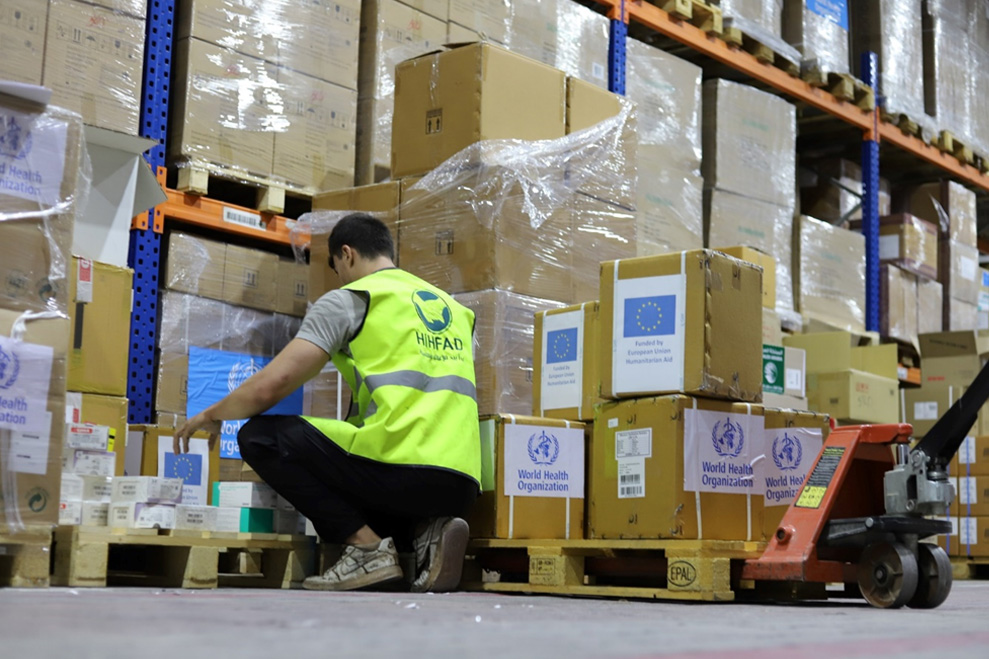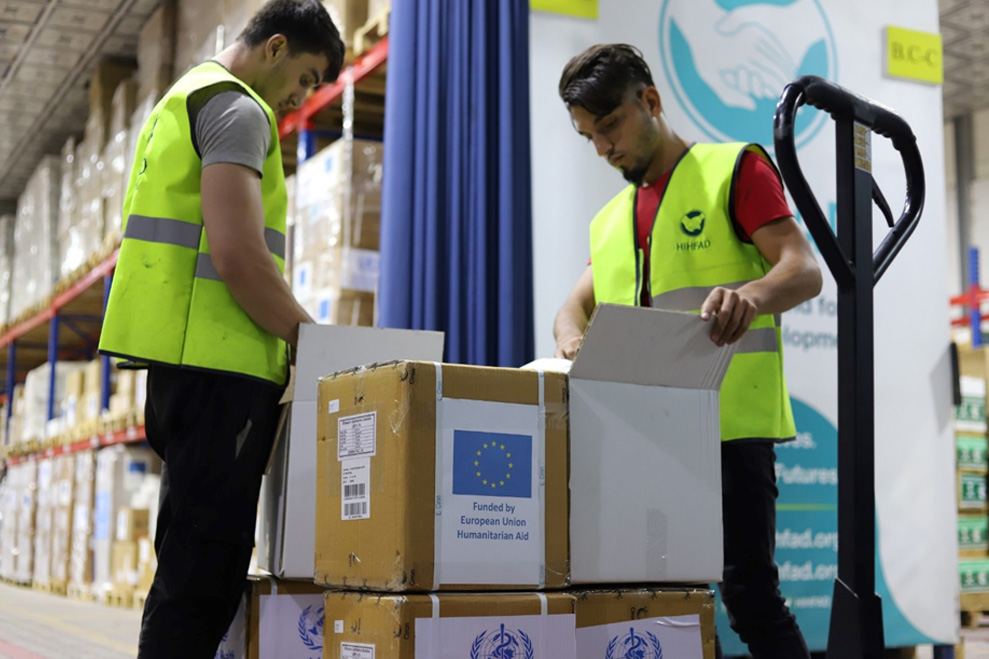 Majd Qolghasi, Warehouse Officer with Hand in Hand for Aid and Development, checks EU-funded medical supplies at the WHO-managed warehouse in Sarmada, Idlib. Photo credit: WHO16 September 2025, Idlib, Syrian Arab Republic – In a warehouse in Sarmada, boxes of medicines and surgical kits are stacked neatly on pallets, ready to be dispatched to health facilities across Syria. For Majd Qolghasi, Warehouse Officer with Hand in Hand for Aid and Development, the health partner managing WHO’s warehouse in Idlib, each shipment represents more than supplies – it is a lifeline for patients.
Majd Qolghasi, Warehouse Officer with Hand in Hand for Aid and Development, checks EU-funded medical supplies at the WHO-managed warehouse in Sarmada, Idlib. Photo credit: WHO16 September 2025, Idlib, Syrian Arab Republic – In a warehouse in Sarmada, boxes of medicines and surgical kits are stacked neatly on pallets, ready to be dispatched to health facilities across Syria. For Majd Qolghasi, Warehouse Officer with Hand in Hand for Aid and Development, the health partner managing WHO’s warehouse in Idlib, each shipment represents more than supplies – it is a lifeline for patients.
 Warehouse staff organize EU-funded medical supplies at WHO’s warehouse in Sarmada, Idlib, before dispatch to health facilities. Photo credit: WHO “This shipment comes in response to the growing needs of the health sector,” says Majd. “It will significantly support hospitals and health centres by strengthening their capacity to provide medical services to patients – especially under the difficult circumstances the sector is facing, with limited resources and funding.”
Warehouse staff organize EU-funded medical supplies at WHO’s warehouse in Sarmada, Idlib, before dispatch to health facilities. Photo credit: WHO “This shipment comes in response to the growing needs of the health sector,” says Majd. “It will significantly support hospitals and health centres by strengthening their capacity to provide medical services to patients – especially under the difficult circumstances the sector is facing, with limited resources and funding.”
The most recent consignment, delivered with support from the European Union (EU) through its Civil Protection and Humanitarian Aid Operations (ECHO), included essential medicines, medical consumables and surgical supplies. Distribution is carried out through a carefully planned system in coordination with the local Health Directorate under the leadership of the Ministry of Health, ensuring that health partners operating in Idlib and Aleppo can serve the people most in need.
Air bridge to Syria’s health facilities
This is not the first time EU support has sustained Syria’s fragile supply chain. In December 2024, more than 50 tonnes of EU-funded medicines and supplies were flown to Türkiye through the EU Humanitarian Air Bridge and transported by WHO to overstretched health facilities in Idlib and Aleppo. The delivery arrived at a pivotal moment as the country entered a transitional phase, helping facilities restock amid persistent needs.
Meeting emergencies head-on
From routine care to crisis response, timely supplies are vital to keep Syria’s health system functioning.
“These shipments help ensure the continuity of life-saving services for both chronic conditions and emergencies,” Majd explains. “Hospitals, health centres and mobile medical units are better supported, easing the pressure on facilities and enabling medical teams to provide immediate and continuous care.”
 EU-funded medical supplies are loaded for delivery from WHO’s warehouse in Idlib to hospitals and clinics. Photo credit: WHO Following the recent blasts in Idlib in July this year, WHO responded within 24 hours in coordination with the Health Directorate and partners – delivering 24 trauma kits to support emergency medical care. Each kit includes essential drugs, anaesthesia supplies, transfusion materials, dressing sets and surgical tools – enough to support more than 200 surgical procedures.
EU-funded medical supplies are loaded for delivery from WHO’s warehouse in Idlib to hospitals and clinics. Photo credit: WHO Following the recent blasts in Idlib in July this year, WHO responded within 24 hours in coordination with the Health Directorate and partners – delivering 24 trauma kits to support emergency medical care. Each kit includes essential drugs, anaesthesia supplies, transfusion materials, dressing sets and surgical tools – enough to support more than 200 surgical procedures.
Majd recalls the impact clearly: “We had the trauma kits ready in the warehouse. When the blasts happened, the needs were identified by health authorities and partners, and we were able to send them immediately. That speed saved lives.”
This was also evident during the devastating wildfires in Lattakia earlier this summer. WHO delivered eight Trauma and Emergency Surgery Kits for burn care from its Idlib warehouse. Four kits were provided to Lattakia’s National and University Hospitals to treat people with severe burns, while another four were pre-positioned as contingency stock for future needs. Each kit contained supplies to manage 50 burn cases – helping health workers save lives when every minute counts.
Strengthening emergency response and continuity of care
Since 2011, Syria’s health system has been tested by conflict, economic crisis and multiple emergencies. EU support has been a cornerstone in strengthening resilience.
 Health partner staff prepare EU-funded medical consignments at WHO’s warehouse in Sarmada ensuring medicines and supplies reach facilities on time. Photo credit: WHO Since last year, the European Union (EU), through its Civil Protection and Humanitarian Aid Operations (ECHO) has provided around €10.4 million to WHO across Syria, supporting ambulances, referral systems, essential medicines, primary health care, trauma services and more. Of this, over €4.1 million has gone towards medical procurement, ensuring essential medicines and supplies reached over 1 million people in need.
Health partner staff prepare EU-funded medical consignments at WHO’s warehouse in Sarmada ensuring medicines and supplies reach facilities on time. Photo credit: WHO Since last year, the European Union (EU), through its Civil Protection and Humanitarian Aid Operations (ECHO) has provided around €10.4 million to WHO across Syria, supporting ambulances, referral systems, essential medicines, primary health care, trauma services and more. Of this, over €4.1 million has gone towards medical procurement, ensuring essential medicines and supplies reached over 1 million people in need.
A new EU commitment of €22 million will sustain life-saving and life-sustaining health services for more than 6.5 million people into next year – keeping hospitals, clinics, referral pathways and medical supply chains running as the country begins its transition to recovery and rebuilding, while still maintaining critical humanitarian services.
“For us, every box in this warehouse means hope,” says Majd. “Thanks to the EU’s support, we can move quickly when emergencies happen and keep services running for the people who depend on them. That is what makes the difference.”








